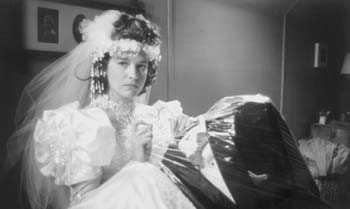Sweet William
The Language of Flowers: Symbolic blooms say a lot during the tumultuous wedding of Rosemary (Kerry Fox).
Mixed bouquet: A wedding and a suicide
THICKLY BUTTERED with symbolism as it is, The Hanging Garden is too rich for the ordinary appetite. The film is set on the Nova Scotia coast in summer, under a sky so sullen that it's an unhappy mirror of the gloomy Bay Area weather outside. The film tells the story of a worm's return. A once battered, barely loved, obese gay boy comes home to his sister's garden-party wedding, but he has been transformed by the years. He's now slender and sure of himself; he drops hints about a man who loves him. The awfulness of his family yields one surprise. He has a new sister, about 10 years old, called Violet (as in lavender). She is very butch; her first line is "I don't want to be a goddamn flower girl." Nothing else has changed. Grandma Grace (Joan Orenstein), a religious nut, is nuttier still. Mom Iris (Seana McKenna), once just repressed, now wears a face as tight as a drumhead. Dad (Peter MacNeill), a.k.a. "Whiskey Mac," is also tight--he's a mean drunk marinated in Moosehead.
Director Thom Fitzgerald dresses the film in a black-whimsical botanical conceit: everyone has a botanical name. Flowers, blooming and dying, are seen in time-lapse photography, and episodes of the film are titled "Love Lies Bleeding" and "Lad's Love." The returned hero, called "Sweet William" (Chris Leavins), in turn calls his dad Poppy and his mom, with her pregnant silences, Mum. Flowers are cut down and yet spring up again. We're led to suspect that the sleek, happy new William may be just the ghost of a budding possibility--since a phantom of the teenage boy he was hangs by the neck in the middle of the garden party for those who want to see it: a suicide.
Well, The Hanging Garden deserves an "e" for effort--or a "p" for peculiarity. By softening the real agony of gay teenagers with a magical-realist frame, Fitzgerald leaves a lot of logical questions unanswered. Why would the angry, profane older sister, Rosemary (Kerry Fox), bother to have a white wedding in the first place? Why is she marrying a man she apparently doesn't love and suspects is gay? (I understand this is a gay parody of a straight wedding--the bride is a rageball and the groom is secretly queer--but there doesn't seem to be enough family strength here to rally for a sham.)
What class are these people? Since they're strange combos of Martha Stewart and the Kowalskis from A Streetcar Named Desire, The Hanging Garden never establishes a consistent tone. The ordinary logic, and not the magical-realist elements, make it hard to believe. As in last year's Canadian import Lilies, it's exciting to see the gay film mixed with surreal elements, telling an offbeat story of coming out. But Fitzgerald's direction and writing are too often a textbook example of what's meant by the phrase "on the nose": there are just too many painfully literal interpretations of lines and stagy pauses, and the happy ending denies the gothic moodiness that's come before.
[ San Jose | Metroactive Central | Archives ]
![]()

Chris Reardon
The Hanging Garden (R; 91 min.) directed and written by Thom Fitzgerald, photographed by Daniel Jobin and starring Chris Leavins and Kerry Fox.
From the June 11-17, 1998 issue of Metro.
![[Metroactive Movies]](/movies/gifs/movies468.gif)